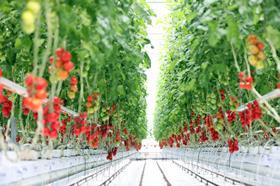
As Britain’s third-largest fresh produce category, tomatoes are a mature industry. But these are heady times once more for the bulbous fruit. The category has grown by £60 million in the past four years, including a not unimpressive four per cent in the past 12 months, up to a value of £798m.
Much of the growth in value has been attributed to the successful marketing of premium varieties, especially cherry and plum varieties on the vine, which have resonated with a public eager to develop new, more wholesome, cooking skills.
Paul Faulkner, from Eric Wall, is one grower seeing how the public is responding well to new tomato varieties. He says this year’s summer crop is shaping up well too. “The quality of the product this year is absolutely superb. We have always been focussed on class one yield. The exciting thing for us has been how well varieties such as Ruby Jewel have done over the past few years.”
Faulkner’s optimism in the product is reflected across the industry, which is putting its money where its mouth is and investing. One of the big stories at the moment is the construction of what will be Britain’s largest tomato glasshouse in Pershore, Worcestershire by Evesham Vale Growers. The fact that it will be completed just one year after Sterling Suffolk’s own giant glasshouse near Ipswich, slated to produce £8m worth of tomatoes a year, shows the speed at which growers are expanding.
EVG commercial director David Shepherd says: “We have got 20 acres going up which will be ready for this winter. We’re still in the construction phase, but planting will start this summer. It will be entirely tomatoes, and premium varieties. We will start picking in August and September, with planting in June.”
Shepherd says alongside being one of the UK’s largest glasshouses, it will also boast state-of-the-art sustainability credentials. “It’s powered by green energy using anaerobic digestion as well as a 120-acre solar farm. There will be zero landfill.”
Beyond the scale of the new glasshouses, a novel aspect is the backing of big business, a rare occurrence in horticulture. Sterling Suffolk’s glasshouse construction was financed by fund manager Amberside Capital. The company’s director, David Scrivens, clearly saw the same potential for tomatoes as growers in the industry do, when interviewed for Wealth Club. “There’s a lot of tomatoes being grown in the world but in the UK there’s not enough tomatoes to supply the demand that’s growing for UK produce.
“We feel it’s a really good time, especially with Brexit we’re seeing exchange rates on imported tomatoes going up so it’s a very good time for growing UK produce.”
Scrivens added that horticulture could become more attractive to capital investment as it falls outside traditional portfolios. “This sector is fairly unique and different, we think it’s a nice diversifier for people’s portfolios. If you are not looking for massive returns but more secure cash flow returns, it’s an interesting project to put in your mix.”
EVG and Sterling Suffolk are not the only companies with new glass going up. The northern producer, Flavourfresh Salads, is also bolstering its tomato capacity with the construction of a new glasshouse pushing out its first crop this year. Flavourfresh grower Andy Roe’s new sweeter beef tomato, featured on the BBC’s Supermarket Secrets, combines the sweetness of cherry varieties with the constitution of beef tomatoes.
“The UK consumer is different to Europe,” Faulkner says. “There is a drive for more flavoursome varieties, such as premium cherry on the vine. In the last few years we have seen the idea of different colours, which are in fact very traditional, putting a lot of colour into them; getting something that looks great and tastes great.”
True to his word, Eric Wall has just launched a new variety dubbed Caramella, hitting shelves last week in the Sainsbury’s Taste the Difference range. A brownish, cherry on-the-vine tomato, Faulkner hopes it will appeal to current tastes. “The colour makes it attractive but the taste is the most important thing.” Faulkner adds.
As with all categories, there are clouds gathering, however, that could block some of the sunlight. Unique to the crop is the threat of Tomato Brown Rugose Fruit Virus, which doesn’t kill the fruit, but leaves them unmarketable, with discolouration and brown spots. Laura Holt from R&L Holt says site visits are being cancelled to prevent the spread of the virus. “That is a major threat on the horizon,” she adds.
Phil Pearson, group development director at APS Group, says: “As an industry we need to work together to prevent crops suffering business-damaging crop loss, and I’m delighted that the AHDB and Fera have responded very quickly to our call for help. Collectively we must leave no stone unturned.”
Alongside the Rugose virus are the usual suspects of labour shortages and low price margins, which growers feel are holding them back. Unlike in other industries though, there is a willingness to invest, which is a sure sign of health. “We have been investing heavily,” says Holt, who is now looking at winter production as one area that could be a happier hunting ground. “We’re going to lit production for the winter to try to see if that can make a difference to get a better price.”
Faulkner concurs: “I think that all growers are looking to expand. The demand is there, we need to get out and fulfil that demand. Labour is our biggest challenge.”
With British Tomato Fortnight nearing, the industry will aim to keep raising demand, having enjoyed recent success with premium varieties.
Faulkner suggests that the industry is blessed with a versatile crop, but that must be properly marketed to shoppers who are increasingly adventurous. “Tomatoes are so versatile, whether stuffing them, roasting or using in a traditional salad. It’s those areas we need to be looking at as British growers, asking ‘where can we highlight their versatility?’”






No comments yet